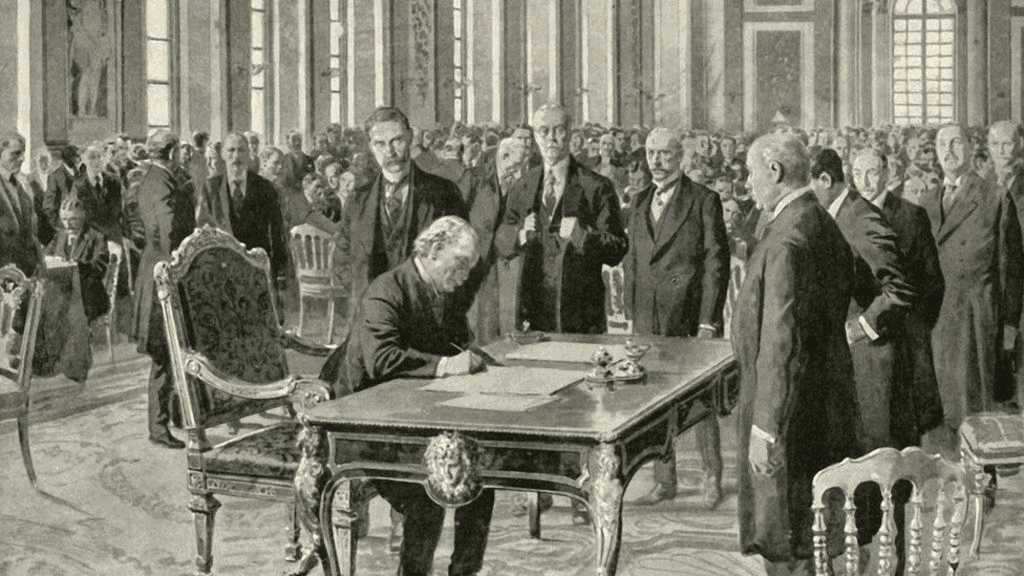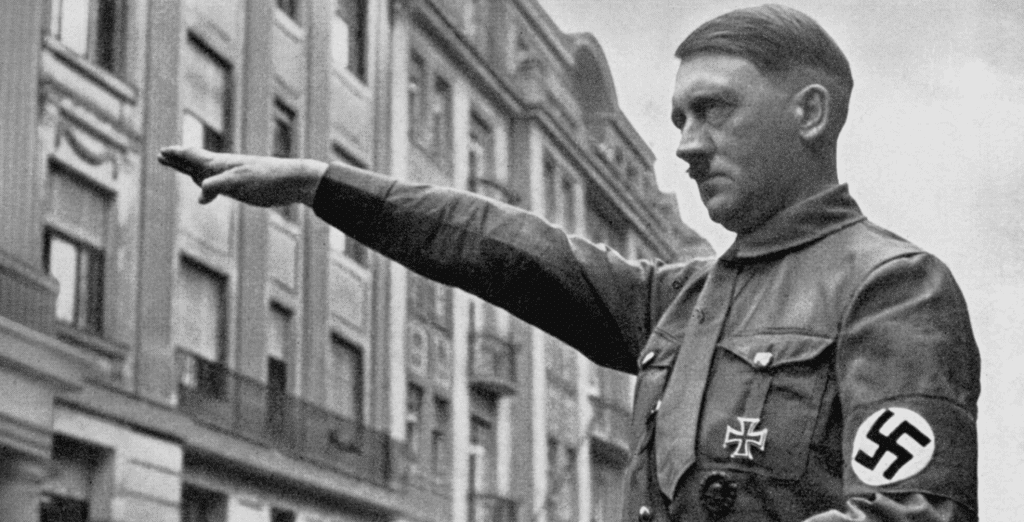Class 9 History Chapter 3 Previous Year Questions - Nazism and the Rise of Hitler
Short Answer Type Questions
Q.1. “The Treaty of Versailles was humiliating on the Germans.” Give three examples in support of your answer. [2025]
Ans. The Treaty of Versailles was humiliating for the Germans for several reasons:
- Germany lost its overseas colonies, a tenth of its population, 13% of its territories, 75% of its iron, and 26% of its coal to countries like France, Poland, and Denmark.
- The Allied powers demilitarised Germany, significantly reducing its military strength.
- The War Guilt Clause placed full responsibility for the war on Germany, leading to widespread resentment.
- Germany was compelled to pay compensation of £6 billion, which crippled its economy.
- The Allied armies occupied the Rhineland, a resource-rich area, for much of the 1920s.
 The Treaty of VersaillesQ.2. “The First World War left a deep imprint on European society and polity.” Support the statement with three examples. [2025]
The Treaty of VersaillesQ.2. “The First World War left a deep imprint on European society and polity.” Support the statement with three examples. [2025]
Ans. The First World War significantly impacted European society and politics in several ways:
- Economic Shift: Europe transitioned from being a continent of creditors to one of debtors.
- Social Hierarchy: Soldiers were placed above civilians, leading to a glorification of military life by the media.
- Political Instability: The war fostered support for conservative dictatorships, undermining the fragile concept of democracy.
These changes reflected the deep scars left by the war, shaping the future of Europe.
Q.3. List the communities which were classified as undesirable in Nazi Germany. [2025]
Ans. The communities which were classified as undesirable in Nazi Germany were as given below:
(i) Jews too were inferior, threatening the biological purity of the superior Aryan race.
(ii) Gipsies and blacks living in Germany were considered as racial inferiors who threatened the biological purity of the 'Superior’ Aryan race.
(iii) Russians and Poles were considered subhuman, and hence undeserving of any humanity. When Germany occupied Poland and parts of Russia, captured civilians were forced to work as slave labour. Many of them died simply through hard work and starvation.
Q.4. ‘‘USA initially resisted involvement in the Second World War but was unable to stay out of the war for long.” Support the statement. [2024]
Ans. The USA initially resisted involvement in the Second World War due to the economic challenges it faced after the First World War. However, it could not remain neutral for long because:
- Japan's Expansion: Japan was increasing its power in the East, having occupied French Indochina.
- Threat to US Interests: Japan planned attacks on US naval bases in the Pacific.
- Pearl Harbor Attack: Japan bombed the US base at Pearl Harbor, forcing the USA to enter the war against Hitler and his allies.
Ultimately, the USA's involvement was a response to direct threats, leading to its participation in the war, which ended in May 1945 with the defeat of Hitler.
Q.5. Mention the communities termed as ‘desirables’ and ‘undesirables’ by the Nazis. [2023]
Ans. The ‘desirables’ in Nazi ideology were:
- Blond, blue-eyed, Nordic German Aryans.
- They were considered racially pure and ideal citizens in Nazi ideology.
The ‘undesirables’ included:
- Jews, who faced extreme persecution.
- Gypsies and blacks, labelled as racial inferiors.
- Germans with physical or mental disabilities were also labelled as ‘undesirable’.
Under the Euthanasia Programme, many of these individuals were condemned to death. The Nazis aimed to eliminate all who did not fit their vision of a superior race.
Q.6. Describe the events which happened in 1945 when Germany surrendered to the Allies. [2023]
Ans. (a) In May 1945 Germany surrendered to the Allies. Hitler and his propaganda minister Goebbels and his family committed suicide in his Berlin bunker.
(b) As the Allied armies overran the areas, occupied by Nazi Germany, they came across many concentration camps where people were on the last stage of their life.
(c) When the war seemed lost, the Nazi leaders distributed petrol to their subordinates to destroy all evidence available in the offices.
Long Answer Type Questions
Q.1. Explain features of Hitler’s policy towards the Polish people under his rule. [2025]
Ans. The main features of Hitler's policy towards the Polish people included:
- Subhuman Status: Poles were viewed as subhuman, leading to the belief that they did not deserve any humane treatment. Captured civilians were forced into slave labour.
- Territorial Division: Occupied Poland was divided, with much of north-western Poland annexed to Germany.
- Forced Relocation: Poles were expelled from their homes to make way for ethnic Germans brought in from other occupied areas. They were then herded into a region known as the General Government, designated for all 'undesirables'.
- Intellectual Suppression: Many members of the Polish intelligentsia were murdered to keep the population intellectually and spiritually submissive.
- Child Abduction: Polish children who resembled Aryans were forcibly taken from their mothers. Those who passed racial tests were raised in German families, while others were sent to orphanages where many perished.
 Q.2. Highlight the five events of 1933 that led to the destruction of democracy in Germany. [2024]
Q.2. Highlight the five events of 1933 that led to the destruction of democracy in Germany. [2024]
OR
Explain any five features of political policy adopted by Hitler after coming to power in 1933. [2023]
OR
How was democracy destroyed in Germany?
Ans. The events of 1933 that led to the destruction of democracy in Germany are:
- 30 January 1933: President Hindenburg appointed Hitler as Chancellor, allowing him to begin dismantling democratic structures.
- February 1933: A mysterious fire occurred in the German Parliament, aiding Hitler's agenda.
- 28 February 1933: The Fire Decree was issued, suspending civil rights such as freedom of speech, press, and assembly, which were guaranteed by the Weimar Republic.
- March 1933: Many Communists, seen as enemies by Hitler, were sent to concentration camps, facing severe repression.
- 3 March 1933: The Enabling Act was passed, allowing Hitler to rule without Parliament's consent. It banned all political parties and trade unions except the Nazi Party, giving the state complete control over the media, army, and judiciary.
|
63 videos|637 docs|78 tests
|
FAQs on Class 9 History Chapter 3 Previous Year Questions - Nazism and the Rise of Hitler
| 1. What were the main factors that led to the rise of Nazism in Germany? |  |
| 2. How did Adolf Hitler consolidate power after becoming Chancellor of Germany? |  |
| 3. What role did propaganda play in the Nazi regime? |  |
| 4. What were the consequences of the Nazi regime's policies on minorities? |  |
| 5. How did the international community respond to Hitler's expansionist policies before World War II? |  |

















